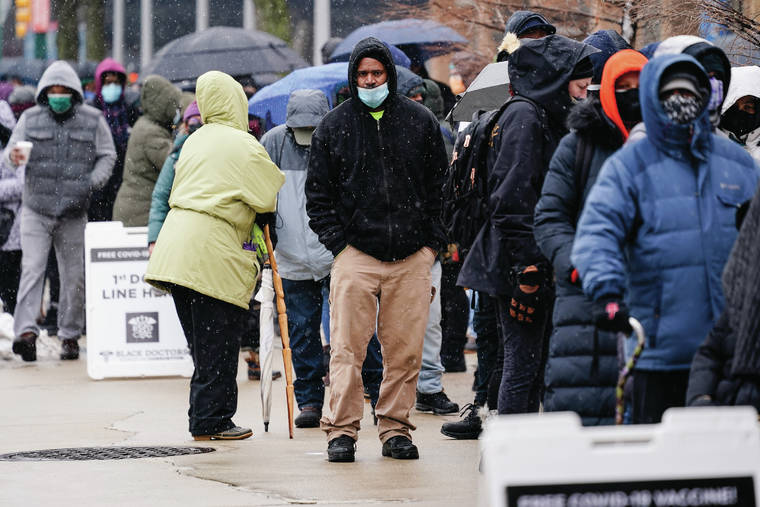HOUSTON — A giant vaccination center is opening in Houston to administer 126,000 coronavirus doses in the next three weeks. Nevada health officials are working overtime to distribute delayed shots. And Rhode Island is rescheduling appointments after a vaccine shipment failed to arrive as scheduled earlier in the week.
From coast to coast, states were scrambling Tuesday to catch up on vaccinations a week after winter storms battered a large swath of the U.S. and led to clinic closures, canceled appointments and shipment backlogs nationwide.
But limited supply of the two approved COVID-19 vaccines hampered the pace of vaccinations even before extreme weather delayed the delivery of about 6 million doses.
The White House promised on Tuesday that help is on the way.
States can expect about 14.5 million doses of the coronavirus vaccine this week, an almost 70% increase in distribution over the past month, White House press secretary Jen Psaki said Tuesday. And White House coronavirus coordinator Jeff Zients told governors on Tuesday that the number of doses sent directly to pharmacies will increase by about 100,000 this week, Psaki said.
The stepped-up efforts come as the COVID-19 death toll in the U.S. surpassed 500,000, far more than any other country.
More than 44 million Americans have received at least one dose of either the Pfizer or Moderna vaccine, and about 1.4 million per day received either a first or second dose over the past seven days, according to the Centers for Disease Control and Prevention.
Although average daily deaths and cases have been falling, some experts say not enough Americans have been inoculated for the vaccine to be the reason. The decline instead is attributed to the passing of the holidays, more people staying indoors during the winter and better adherence to mask rules and social distancing.
What’s more, they warn that dangerous variants could cause the trend to reverse itself. States are responding by simultaneously trying to catch up from last week’s pause and gear up to vaccinate more people in coming weeks.
Houston’s federally funded vaccination site will open Wednesday at NRG Park, operating seven days a week for three weeks to distribute 126,000 first doses, before transitioning to second doses, officials said.
Texans are recovering from a devastating winter storm that killed at least 35 people, left millions without power and water, and delayed vaccinations.
“It’s been trauma after trauma, and people deserve some good news, some hope,” said Harris County Judge Lina Hidalgo, the county’s chief elected official.
In Buda, Texas, retired teachers Donna and Gerald Haschke, both 74, were supposed to get their second doses last week but their appointments were canceled three times because of the storm. They’re scheduled to receive doses on Thursday.
The couple are eager to get completely vaccinated after months of having to scale back all their activities because of the coronavirus. Gerald Haschke has heart stents and Donna Haschke has atrial fibrillation, she said.
“My cardiologists said, ‘You do not want to get COVID,’” Donna Haschke said. “I said, ‘No, I don’t.’ To me that was a warning that I need to stay home.”
In Mississippi, where COVID-19 vaccinations plummeted last week amid freezing temperatures and icy roads, health officials were automatically rescheduling appointments, and planned to schedule more than normal through the weekend.
The state Department of Health said Monday that just 32,540 vaccinations were given in the state last week, down from 106,691 the previous week.
Nevada Gov. Steve Sisolak said Monday that 46,000 doses of Moderna’s COVID-19 vaccine that were delayed by weather began arriving in the state. The head of the state’s Bureau of Child, Family and Community Wellness said officials would work overtime to administer those doses along with this week’s regularly scheduled shipment.
President Joe Biden has said that every American who wants a vaccine will be able to get one by the end of July.
But demand continues to outpace limited supplies distributed by the U.S. government.
Executives from five companies with contracts to supply shots to the U.S. — Pfizer, Moderna, Johnson &Johnson, AstraZeneca and Novavax — testified about supply issues Tuesday before Congress’ Energy and Commerce Committee.
Looking ahead to summer, Pfizer and Moderna executives said they expect to complete delivery of 300 million doses each, and J&J aims to provide an additional 100 million doses — more than enough to vaccinate every American adult.
Arizona will increase vaccinations by opening its fourth state-run mass vaccination clinic, state health department officials said. In addition, transportation costs to and from vaccination appointments now will be covered for people enrolled in Arizona’s Medicaid program, Gov. Doug Ducey said.
“This change will make it easier for our most vulnerable Arizonans … to get vaccinated,” Ducey said.
California Gov. Gavin Newsom said 11 mobile clinics will open in California’s vast Central Valley, an agricultural region that’s been hit hard by the coronavirus. They’ll be used mainly to vaccinate farmworkers who don’t have transportation to larger vaccination sites or can’t navigate the state’s online signup portal.
Newsom said the state also is sending 34,000 extra vaccine doses to that area from a pharmacy that wasn’t using them quickly enough.
Meanwhile, Tenessee’s top health official said Tuesday that more than 2,400 doses of the COVID-19 vaccine went to waste over the past month in Shelby County, which encompasses Memphis, while local officials sat on tens of thousands of shots that they thought had already gone into arms.
Health Commissioner Lisa Piercey said a Department of Health investigation over the weekend found issues dating to Feb. 3 that included spoiled doses, an excessive vaccine inventory, insufficient record-keeping and no formal process to manage soon-to-expire vaccines. A federal investigation is also expected.



